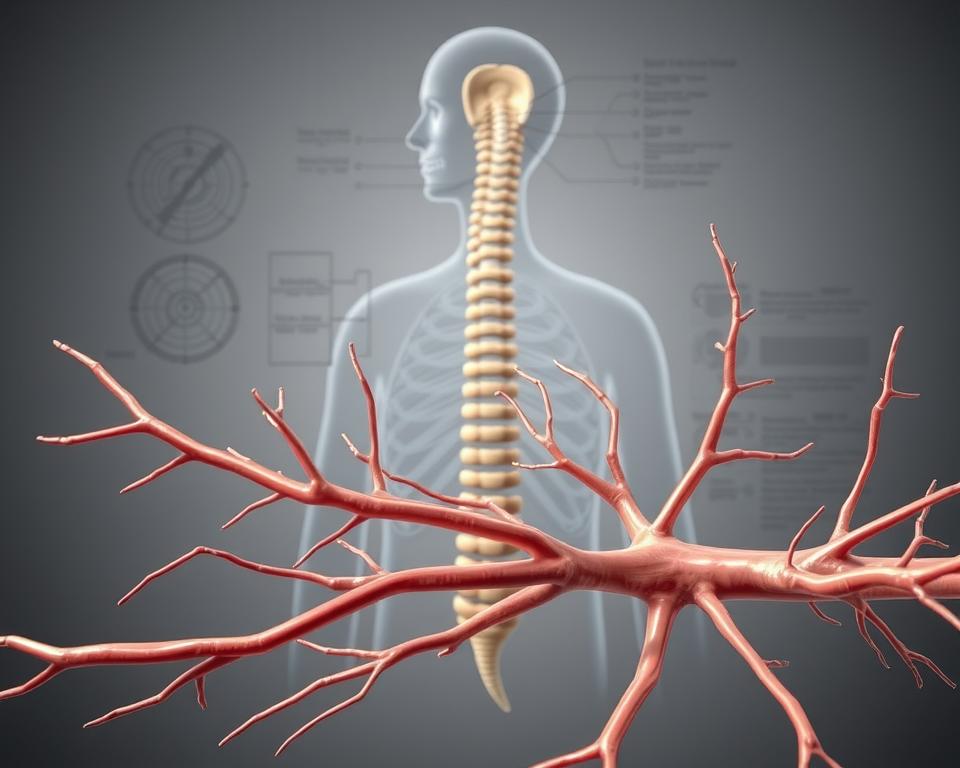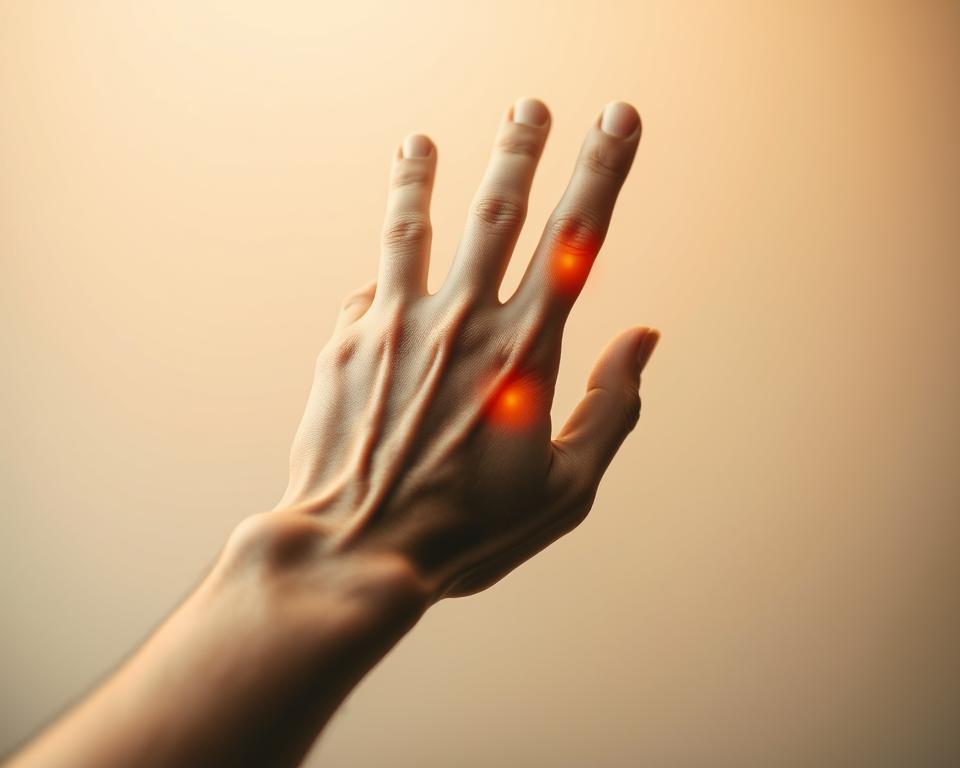Neuropathy is a condition that affects the nerves. It leads to tingling, numbness, or weakness in different parts of the body. It often shows up in the hands and feet, making everyday tasks uncomfortable.
Damage to the nerves can cause a range of symptoms. This includes burning sensations or pain. For more detailed information on the causes and types of nerve damage, further resources are available.
Key Takeaways
- Neuropathy affects the nerves, causing discomfort.
- Common symptoms include numbness, tingling, and pain.
- It often affects the hands and feet.
- Simple tasks can become challenging due to nerve damage.
- Understanding the condition is key to managing its impact.
Understanding Neuropathy: The Basics
To understand neuropathy, start with how nerves work and what happens when they’re hurt. Neuropathy is a condition from damage to the peripheral nervous system. This system includes nerves outside the brain and spinal cord.
These nerves are key for sending and getting messages between the brain and body parts.
Definition and Prevalence
Neuropathy means nerves outside the brain and spinal cord don’t work right. It causes different symptoms based on the nerves hurt. The National Institute of Neurological Disorders says it’s common, hitting many people, like those with diabetes.
How Healthy Nerves Function
Healthy nerves send signals between the brain and body. They help us feel things, move, and control body functions. They make sure our body works well.
What Happens During Nerve Damage
Nerve damage, or neuropathy, messes with nerve signals. This can cause numbness, tingling, pain, or weakness. The damage’s level can vary, affecting life quality a lot.
Doctors say neuropathy is hard to diagnose and treat because of its many causes and symptoms.
In short, knowing about neuropathy means understanding its definition, how common it is, and how nerve damage affects us. By learning these basics, we can better handle neuropathy and its health effects.
The Different Types of Neuropathy
It’s important to know the different types of neuropathy. This knowledge helps in diagnosing and treating the condition. Neuropathy covers many nerve conditions. The type of neuropathy affects symptoms and treatment.
Peripheral Neuropathy
Peripheral neuropathy is common. It affects nerves outside the brain and spinal cord. Symptoms include weakness, numbness, and pain in hands and feet.
Autonomic Neuropathy
Autonomic neuropathy impacts the autonomic nervous system. This system controls body functions we don’t consciously control. Symptoms include dizziness, digestive issues, and heart rate and blood pressure changes.

Focal Neuropathy
Focal neuropathy damages a single nerve or group of nerves. Symptoms vary based on the nerve affected. They can include pain, weakness, or numbness in a specific area.
Proximal Neuropathy
Proximal neuropathy is rare and complex. It affects nerves in the thighs, hips, or buttocks. Symptoms include pain and weakness, making it hard to stand or walk.
Cranial Neuropathy
Cranial neuropathy affects nerves directly connected to the brain. Symptoms vary based on the nerve affected. They can include double vision, facial weakness, or trouble swallowing.
Each type of neuropathy has its own symptoms and needs a specific treatment plan. Getting the right diagnosis is essential for effective management.
Common Causes of Neuropathy
Finding out why someone has neuropathy is key to helping them feel better. Neuropathy is when nerves get damaged. Knowing what causes it helps doctors find the right treatment.
Diabetes: The Leading Cause
Diabetes is the top reason for neuropathy, known as diabetic neuropathy. High blood sugar can hurt nerves. This leads to numbness, tingling, and pain, mostly in the feet and hands.
Autoimmune Disorders
Autoimmune disorders make the body attack itself. This can hurt nerves. Conditions like rheumatoid arthritis and lupus can cause nerve damage through inflammation.
Infections and Viruses
Some infections and viruses can damage nerves. For example, Lyme disease and shingles can cause neuropathy. These show how different things can lead to nerve problems.
Medications and Toxic Substances
Some medicines, like those in chemotherapy, can hurt nerves. So can toxic substances. The damage can happen directly or through other ways.
Physical Trauma and Pressure
Getting hurt or having nerves pressed can cause neuropathy. This can happen from accidents or doing the same thing over and over. Carpal tunnel syndrome is an example.
Nutritional Deficiencies
Lacking vitamins B12 and B6 can hurt nerves. Not eating enough of these or not being able to absorb them can cause nerve damage.
The table below shows common causes of neuropathy and their effects:
| Cause | Typical Effects |
|---|---|
| Diabetes | Numbness, tingling, pain in feet and hands |
| Autoimmune Disorders | Inflammation, nerve damage, varied symptoms |
| Infections/Viruses | Direct nerve damage, autoimmune responses |
| Medications/Toxic Substances | Nerve damage, toxicity-related symptoms |
| Physical Trauma/Pressure | Nerve compression, injury-related neuropathy |
| Nutritional Deficiencies | Nerve damage, deficiency-related symptoms |
Knowing why someone has neuropathy is key to helping them. Doctors can then make a plan to help symptoms and slow the disease.
Recognizing Neuropathy Symptoms
It’s important to know the signs of neuropathy early. This helps in getting the right treatment. Neuropathy shows itself in many ways, so it’s key to understand its symptoms.
Sensory Symptoms: Numbness, Tingling, and Pain
Sensory symptoms are common in neuropathy. You might feel numbness, tingling, or pain in certain areas. Numbness feels like losing feeling, and tingling is like pins and needles.
Pain from neuropathy can be mild or very bad. It might feel like burning, stabbing, or aching.
Motor Symptoms: Weakness and Coordination Problems
Motor symptoms happen when neuropathy hits the motor nerves. This can make muscles weak, making daily tasks hard. It can also mess with balance and how you walk.

Autonomic Symptoms: Body Function Disruptions
Autonomic neuropathy messes with the autonomic nervous system. This system controls things you don’t think about, like blood pressure and digestion. Problems here can really affect your life.
Symptom Progression Patterns
How symptoms of neuropathy get worse can differ a lot. Some people see symptoms slowly get worse, while others see them pop up fast. Knowing how your symptoms will progress is key to managing them.
When to Seek Immediate Medical Care
If you have sudden symptoms, really bad pain, or big changes in how your body works, see a doctor right away. A doctor can figure out what’s wrong and suggest the best treatment.
| Symptom Category | Common Symptoms |
|---|---|
| Sensory | Numbness, Tingling, Pain |
| Motor | Weakness, Coordination Problems |
| Autonomic | Blood Pressure Changes, Heart Rate Changes, Digestion Issues |
Risk Factors for Developing Neuropathy
Knowing the risk factors for neuropathy is key to preventing it. Some people are more likely to get neuropathy because of different reasons.
Age-Related Vulnerability
Age is a big risk factor for neuropathy. As we get older, our nerves can get damaged more easily. The Mayo Clinic says older adults are more likely to get neuropathy because of nerve wear and tear.
Pre-existing Health Conditions
Having health issues like diabetes, autoimmune diseases, or infections raises the risk of neuropathy. It’s important to manage these conditions well to avoid nerve damage.
Lifestyle Factors and Habits
Our lifestyle choices can also affect our risk of neuropathy. Drinking too much alcohol, smoking, and eating a bad diet can all play a part. A healthy lifestyle can help lower this risk.
Genetic and Family History
Genetics can also play a role in some types of neuropathy. If your family has a history of neuropathy, you might be more likely to get it too.
Occupational Hazards
Jobs that expose you to toxins or require repetitive motions can also raise your risk. People in these jobs should take steps to protect their nerves.
| Risk Factor | Description |
|---|---|
| Age | Increased risk with older age |
| Health Conditions | Diabetes, autoimmune disorders, infections |
| Lifestyle | Excessive alcohol, smoking, poor diet |
| Genetics | Family history of neuropathy |
| Occupation | Exposure to toxins, repetitive motions |

By knowing these risk factors, we can take steps to lower our chance of getting neuropathy. Catching it early and managing it well can help prevent nerve damage.
How Neuropathy Is Diagnosed
Diagnosing neuropathy is complex. It involves medical history, physical exams, and special tests. Accurate diagnosis is key for good treatment.
Medical History and Physical Examination
Getting a full medical history is vital. Doctors will ask about symptoms and lifestyle. They also check muscle strength and reflexes.
Neurological Assessment Tests
These tests check nerve function. They see where nerves are damaged. They test how well you feel vibrations or light touch.
Blood Tests and Lab Work
Blood tests find causes like diabetes or vitamin lack. Lab work checks for autoimmunity or infections.
Electrical Tests: EMG and Nerve Conduction Studies
Electrical tests like EMG and nerve conduction studies check nerves and muscles. They find nerve damage and compression.
Imaging Studies and Nerve Biopsies
Imaging like MRI or CT scans find causes like nerve compression. Nerve biopsies take a nerve sample for study.
Healthcare providers use these methods to accurately diagnose neuropathy. Then, they create a treatment plan.
Medical Treatments for Neuropathy
Neuropathy treatment has many parts. It uses different medical ways to lessen symptoms and find the root cause. The main goal is to help people with neuropathy feel better and live better lives.
Pain Management Medications
Pain management is key in treating neuropathy. Doctors use medicines like anticonvulsants, antidepressants, and pain relievers. Some anticonvulsants, like gabapentin, help with neuropathic pain.
Treating Underlying Causes
Fixing the cause of neuropathy can help symptoms go away. For example, controlling diabetes can slow down diabetic neuropathy.
Physical and Occupational Therapy
Physical therapy helps with moving and getting stronger. Occupational therapy helps patients adjust to their condition, making everyday tasks easier.
Transcutaneous Electrical Nerve Stimulation (TENS)
TENS is a non-invasive method. It uses a small electrical device on the body to ease pain. It stops or blocks pain signals to the brain.
Surgical Interventions
Surgery might be needed to relieve nerve pressure or fix other issues causing neuropathy.
Emerging Medical Therapies
New research is finding new ways to treat neuropathy. Gene therapy, stem cell therapy, and other new methods aim to fix or grow back damaged nerves.
Alternative and Complementary Approaches
More people are trying alternative and complementary therapies for neuropathy. These methods can help along with regular treatments. They offer a complete plan for managing neuropathy.

Acupuncture and Traditional Chinese Medicine
Acupuncture is a big part of Traditional Chinese Medicine. It uses thin needles in certain body points to help heal and ease pain. Research shows it can lessen neuropathy symptoms like pain and numbness.
Nutritional Supplements and Vitamins
Nutritional supplements like vitamin B12 and alpha-lipoic acid support nerve health. They might help with neuropathy symptoms. Always talk to a doctor before taking new supplements.
Massage and Manual Therapies
Massage therapy can boost blood flow, ease muscle tension, and relax the body. It’s good for people with neuropathy. Physical therapy and other manual therapies can also help manage symptoms.
Mind-Body Techniques for Pain Management
Mind-body techniques like meditation, yoga, and cognitive-behavioral therapy help with chronic pain. They help relax and reduce stress.
Herbal Remedies and Their Evidence Base
Herbal remedies like evening primrose oil might help with neuropathy symptoms. But, it’s important to check with a doctor first. This is because they could interact with other treatments.
Living Well with Neuropathy: Daily Management
Living with neuropathy can be tough. But, the right daily habits can make a big difference. It’s all about the right mix of medical care and lifestyle changes.
Dietary Considerations and Nutrition
Eating well is key to managing neuropathy. Some foods can help, while others might make things worse. For example, eating foods full of antioxidants, like fruits and veggies, can help your nerves.
Keeping your blood sugar stable is also important, if you have diabetes-related neuropathy.
- Eat foods rich in omega-3 fatty acids, like salmon and sardines, to support your nerves.
- Avoid foods high in sugar or salt that can trigger or worsen symptoms.
- Drink lots of water to stay hydrated.
Exercise and Physical Activity Guidelines
Regular exercise is good for neuropathy. It can improve blood flow, reduce pain, and boost your mood.
- Do low-impact activities like walking, swimming, or cycling.
- Stay away from exercises that strain your nerves, like heavy lifting.
- See a physical therapist to get a custom exercise plan.
Foot Care and Injury Prevention
Good foot care is vital for neuropathy patients. Nerve damage can make you lose feeling in your feet, raising the risk of injury.
- Check your feet every day for cuts, blisters, or other injuries.
- Wear shoes that fit well and are comfortable to avoid pressure sores.
- Keep your feet clean and dry to prevent infections.
Stress Management Techniques
Stress can make neuropathy symptoms worse. Finding ways to manage stress can help.
- Try relaxation methods like deep breathing, meditation, or yoga.
- Do things that make you happy and take your mind off pain.
- If stress is too much, talk to a mental health expert.
Adaptive Equipment and Home Modifications
Adaptive tools and home changes can make life easier with neuropathy.
- Use ergonomic tools and furniture to avoid strain.
- Put in handrails or grab bars to prevent falls.
- Use a walking aid if you have trouble with balance or coordination.
Support Groups and Community Resources
Connecting with others who get it can be really helpful.
- Join a support group for neuropathy.
- Use online forums to share and get advice.
- Look for local groups for more support.
Looking Ahead: Advances in Neuropathy Research and Care
Research into neuropathy is making progress. This is helping us understand the condition better. It’s leading to new treatments and ways to manage it. Advances in neuropathic pain research are giving us important insights.
New treatments are on the horizon. These could help patients feel better and live better lives. Researchers are finding new ways to tackle neuropathy by studying its causes.
The future of treating neuropathy is bright. Ongoing research and new medical tech will bring better treatments. As we learn more, patients will get better care and results.
























































